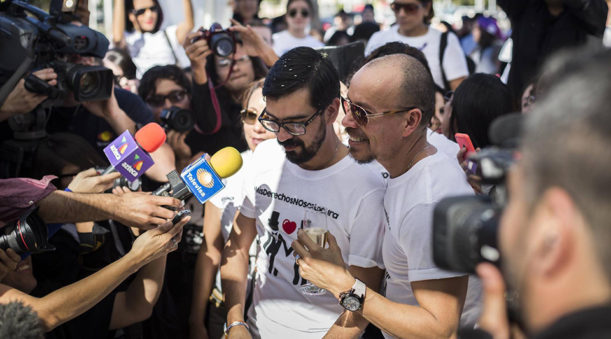Cristina Herrera is ready to Dress (Code) for success…
Todo Cine Latino, the specialty label of Outsider Pictures, has acquired the North American distribution rights to the Latina filmmaker’s No Dress Code Required in a co-acquisition deal with Strand Releasing for the Mexican film, which swept seven of eight prizes at the 2015 FICG pix-in-post showcase.

Produced by Sabrina Almandoz at La Cleta Films, the label she founded with Herrera in 2012, the documentary feature turns on the story of Victor and Fernando, beauty professionals in Baja California, Mexico, whose clients include multiple socialites from their hometown, Mexicali.
“For many of their customers they were a lovely couple, until they decided to marry and become the first gay couple in the state to fight for their rights in a place full of homophobia and inequality,” the film synopsis says.
Mexico’s Supreme Court has issued ruling after ruling that restricting marriage to heterosexual couples is discriminatory. No Dress Code Required tracks the extraordinary series of roadblocks put up by Mexicali’s local mayor and other officials who succeeded in derailing Victor and Fernando’s marriage four times, questioning witnesses’ signatures, announcing a bomb threat as the ceremony was about to go ahead, and arranging a demonstration which prevented them from getting into a civil registrar’s office. A complaint from the Association of Families of Baja California alleged that Victor and Fernando could not marry, given their insanity.
“Through their struggle, they managed to open the eyes of the members of Baja Californian society,” the film’s synopsis says.
Mexican Film Institute Imcine invested in No Dress Code Required’s post-production.
Paul Hudson, CEO of Outsider Pictures, closed the deal with Herrera and Imcine.
“As we have learned from the fight for gay marriage in the U.S., equal rights for the LGBTQ community is a basic civil right that every member of society deserves,” Hudson said.
He added: “Cristina’s film perfectly captures the nightmarish bureaucracy that was put in place to try and stop the constitutional and civil rights of Victor and Fernando.”
“The contemporary era questions if, in effect, Mexicans can enforce the equality of rights established in the Constitution,” Herrera said in a statement. “At this crossroads are members of [Mexico’s] LGBTQ community who desire full recognition of their citizens’ rights and a civil society where sexual difference is still regarded as sin or pathology.”
Todo Cine Latino will look to build word-of-mouth via festivals throughout the spring. It will then theatrically release in Miami and the rest of the U.S. throughout the summer, Hudson said.
The film will then be released on digital streaming site Todocinelatino.com, a U.S. retailer of a significant number of recent prominent Latin American and Spanish movies.
A Fulbright scholar at Hunter College, New York, Herrera studied film at Mexico City’s Centro de Capacitacion Cinematografica (CCC), a Latin American hotbed of young documentary film-making talent.
